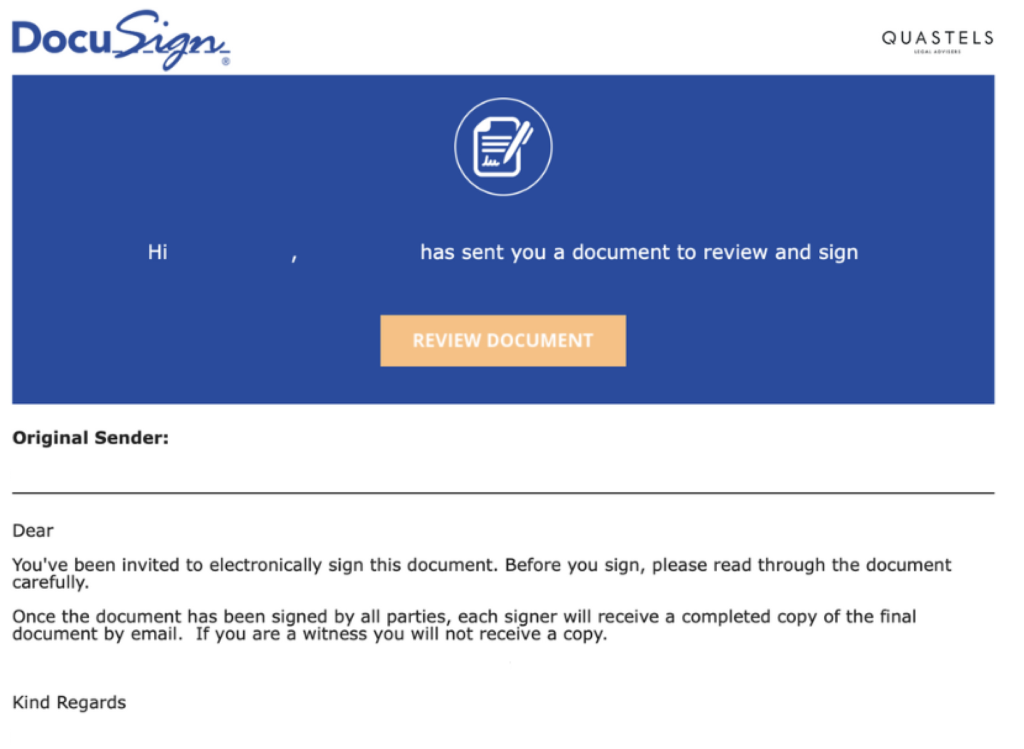Latest Posts

Docusign | How-To Guide
During the conveyancing process, your solicitor/conveyancing executive will ask you to sign a document(s) using Docusign. Below is a simple guide that takes you through the stages of setting up a witness and electronically signing the document(s).
1. Client Receives Email From Docusign (/Infotrack)
Your solicitor/conveyancing executive will set up the signature request, and you will receive an email from Docusign titled ‘Request for Witness Details.’
Please ensure to read the email in full to understand the witness nomination rules, and how to carry out your signing as swiftly and efficiently as possible. All parties involved in the transaction will be sent separate emails with invitations to sign (e.g. a husband and wife purchasing a property together will have to complete this process individually, via the invitations sent to their respective email addresses).
2. Start Signing Process
Click the blue ‘Start Now’ button at the bottom of the Docusign email.

3. Nominate A Witness
In order to sign, you must nominate a witness. All parties can use the same witness however, the witness must be in the physical presence of the signees, must not be related to the signee(s) (for example, your mother/father in law could not be a witness), the witness must also be over 18, and must not be partied to the transaction in any way (ie. giftor).
4. Enter Witness Details and Sign
Enter all required witness details on the left-hand side and once all details have been correctly entered, select the orange ‘Nominate Witness’ button. Once you have successfully appointed your witness, you will be able to proceed with signing the relevant documents. When signing has been completed, please select ‘Finish.’
5. Witness Signs the Documents
At this point, your witness will receive an email from Docusign inviting them to confirm that they witnessed the parties signing. The witness must click the ‘Review Document’ button on the email (you might need to ‘download external images’ in order to see and click this button).

Your witness will need to authenticate their telephone number. Once that is done, the witness will be able to open the document, to confirm T&Cs, and select ‘Continue.’
The witness must then select the ‘Sign’ tab to finalise your signature.
Once all information has been auto-filled, please select the ‘Finish’ button at the top of the page.
Please note, In order for your solicitor to receive the final and completed documents, all parties involved in the transaction and witnesses must have completed all tasks.
6. Signatures Complete
Once all parties have signed, your solicitor will receive a copy of the completed documents.
If you have any queries during this process, please do get in touch with your solicitor or conveyancing executive.
If you require legal assistance for the purchase or sale of a property, please contact our Residential Real Estate team.
Read More
The Return of the UK Investor Visa: A New Era for Global Entrepreneurs?
For years, the UK’s Tier 1 Investor Visa was a pathway for high-net-worth individuals to secure residency through significant investment in the British economy. However, in 2022, the visa was abruptly closed due to concerns over security risks, money laundering, and a lack of tangible economic benefits. Since then, the UK’s approach to attracting foreign investment has been fragmented, with alternatives like the Innovator Founder Visa failing to fill the gap.
Now, as discussions emerge about the potential return of an investor route, the UK faces a critical opportunity: Can it design a new investment-based immigration pathway that both attracts global talent and safeguards national interests?
The Need for a New Investor Route
The UK is at an economic crossroads. While the government prioritises attracting innovative entrepreneurs and skilled workers, foreign direct investment (FDI) remains a crucial driver of growth, job creation, and technological advancement. Countries like Canada, Portugal, and Australia continue to leverage investment migration to their advantage, making the UK’s lack of an Investor Visa a notable gap in its immigration offering.
A Well-Designed Investor Visa Could:
- Boost the UK economy by directing capital into key sectors, such as technology, infrastructure, and green energy.
- Encourage responsible investment through stricter due diligence and a requirement for active economic contribution.
- Strengthen global ties by positioning the UK as a prime destination for international investors and entrepreneurs.
What Might a New UK Investor Visa Look Like?
If reintroduces, an investor visa must learn from the past while aligning with modern economic needs. Likely characteristics include:
- Higher Investment Thresholds
- A move away from passive investment in government bonds and towards funding UK businesses, similar to models seen in Australia and Canada.
- Stricter Due Diligence
- A focus on ensuring funds are from legitimate sources, with robust compliance mechanisms.
- Economic Impact Requirements Investment directed at sectors that align with the UK’s growth agenda, such as AI, fintech, or clean energy.
- More Active Investor Participation
- A preference for investors who take an active role in the UK economy, either through job creation, board positions, or scaling British businesses.
- Faster, More Predictable Processing
- A structured, transparent pathway to residency that reassures investors about stability and policy consistency.
How Should Investors Prepare?
For potential applicants considering the UK as a destination, now is the time to prepare. While no official policy has been announced, businesses and high-net-worth individuals should:
- Monitor policy developments closely to stay ahead of legislative changes.
- Diversify investment portfolios to align with the UK’s expected priority sectors.
- Engage with specialist immigration advisors to structure investments in compliance with evolving regulations.
At Quastels, we work closely with investors, entrepreneurs, and business leaders to ensure they navigate the UK’s immigration landscape strategically and effectively. If you are considering investment opportunities in the UK, our team can provide tailored guidance on the best pathways for securing long-term residency and business success.
The return of an investor visa “if structured correctly” could mark a new era of strategic foreign investment in the UK. The key question now is not if, but when.
For expert guidance on UK investment-based immigration, get in touch with Quastels today.
Read More
The Big, Expensive, Little Winged Problem
This week, in Patarkatsishvili & Anor v Woodward-Fisher [2025] EWHC 265 (Ch), the danger of non-disclosure and evading replies to pre-contract enquiries has come to haunt a seller when a High Court judge ordered that a couple who bought a moth infested £32.5m mansion could have the majority of their monies returned.
The seller in this case, William Woodward-Fisher, when conducting renovation works had included a wool-based insulation in the walls of his luxury Victorian property in West London. This was quite literally a ‘moth trap’ and the little creatures bred within and infested the insulation, which in turn resulted in Mr Woodward-Fisher’s wife noticing the problem.
Various pest control treatments were undertaken which involved periodic sprays and other such preventive measures resulting in at least two reports from pest control companies in 2018 which stated the need to remove the insulation in order to get rid of the infestation.
The Judgement
The court’s analysis and subsequent judgement was based on three main points which ultimately led to the contract being rescinded.
- The Seller provided false replies. Three replies to the pre-contract enquiries were found to be false. Having been aware of the moth infestation and the pest control companies clearly stating that the problem was in the insulation, the Seller’s reply of ‘not aware’ was not considered to be truthful. It was found that the Seller purposely withheld information when stating that he never had the property surveyed for such a problem. He also stated that he was not aware of any hidden defect in the property.
- The Buyer relied on these replies on the basis that they believed they were true. The Buyer’s lawyers reported to the buyer to state that there was no information within the replies to enquiries which concerned them, which in turn led to the Buyer’s decision to process with the purchase transaction. The Buyers stated that had they known about the infestation, they would not have committed to the purchase.
- The Seller knew that the replies he had provided were false. The Seller was well aware of this issue and was purposefully evasive when providing replies to the pre-contract enquiries that were raised. The Seller was not only negligent, he was fraudulent in his misrepresentation.
The Takeaway
The Buyers only discovered the problem after moving in which turned out to be a nightmare, having found moths in their clothes, glassware, and on their toothbrushes.
Caveat emptor is a phrase which is thrown around a great deal in a property transaction, however, it cannot be used as a license to evade and purposefully mislead.
Replies to enquiries must be answered as true statements which cannot be taken as a simple formality. A buyer should be able to rely on these as correct, accurate representations and would be expected to undertake reasonable inspections and not knock down every wall in the property to ensure that the representations made in the replies are correct.
In this case, there was a clear misrepresentation made by the Seller, and the Buyer had relied on these to ultimately proceed with the purchase.
The judge rules that the statements made by the Seller were ‘fraudulent’ and intentionally false. It was not simply an oversight, it was clear that the Seller did not believe the replies he had given. This is what ultimately turned the case for the Buyers as rescission would be the primary remedy.
Had the Seller simply replied ‘rely on survey’, the court may have had more difficulty in reaching a decision. Indeed, the Law Society’s protocol cautions against solicitors raising enquiries as to the physical condition of properties.
We will have to see if this leads to a different approach in the enquiry process.
If you require conveyancing services, please contact Meera Malde or our wider Residential Real Estate team.
Read More